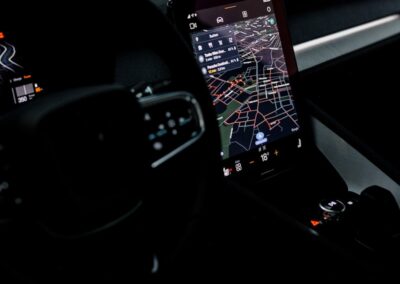The Transformative Impact of 5G Networks on Connected Vehicle Performance
Revolutionizing Communication Capabilities with 5G Networks
In the rapidly evolving landscape of automotive technology, the development of 5G networks and connected vehicle technologies is poised to revolutionize communication capabilities and overall vehicle performance. This advancement is particularly significant in regions like Saudi Arabia and the UAE, where embracing cutting-edge technology is a national priority. The integration of 5G networks with connected vehicle systems promises to enhance real-time communication, improve safety, and drive efficiency.
5G networks offer unprecedented speed and low latency, which are crucial for the seamless operation of connected vehicle technologies. This enables real-time data exchange between vehicles and infrastructure, enhancing vehicle-to-everything (V2X) communication. In cities like Riyadh and Dubai, known for their commitment to smart city initiatives, the deployment of 5G networks is instrumental in supporting advanced transportation systems. Vehicles can communicate with each other and with traffic signals, road sensors, and other infrastructure components, facilitating smoother traffic flow and reducing congestion.
Moreover, the high bandwidth of 5G networks supports the transmission of large volumes of data generated by connected vehicles. This data includes information on vehicle speed, location, and performance, which can be analyzed to provide valuable insights for optimizing vehicle operations and maintenance. The integration of AI and Blockchain technologies further enhances the reliability and security of these data exchanges, ensuring that connected vehicle systems operate efficiently and securely. By leveraging 5G networks, Saudi Arabia and the UAE are setting new benchmarks in transportation innovation and efficiency.
Enhancing Safety and Efficiency with 5G-Enabled Connected Vehicles
The enhanced communication capabilities provided by 5G networks play a critical role in improving the safety and efficiency of connected vehicle technologies. With near-instantaneous data transmission, vehicles can receive and respond to information in real time, reducing the likelihood of accidents and improving overall road safety. In regions like Saudi Arabia and the UAE, where road safety is a top priority, the deployment of 5G-enabled connected vehicles represents a significant advancement.
For example, 5G networks enable advanced driver assistance systems (ADAS) to function more effectively. These systems rely on real-time data to provide drivers with timely warnings about potential hazards, such as sudden braking by a vehicle ahead or a pedestrian crossing the road. The low latency of 5G networks ensures that these warnings are delivered without delay, giving drivers more time to react and avoid accidents. In cities like Riyadh and Dubai, where traffic density is high, the widespread adoption of 5G-enabled ADAS can significantly enhance road safety.
Furthermore, 5G networks support the development of autonomous vehicles, which require constant communication with their surroundings to navigate safely. The high reliability and low latency of 5G are essential for the safe operation of these vehicles, as they enable real-time decision-making and precise control. By investing in 5G infrastructure, Saudi Arabia and the UAE are paving the way for the future of autonomous transportation, positioning themselves as leaders in the adoption of next-generation automotive technologies.
Driving Business Success through Executive Coaching and Change Management
The successful implementation of 5G networks and connected vehicle technologies necessitates effective leadership and strategic change management. Executive coaching services are crucial in equipping business leaders with the skills and knowledge required to navigate this technological transformation. In Saudi Arabia and the UAE, where rapid technological advancements are a cornerstone of economic development, executive coaching helps leaders drive innovation and manage the complexities of integrating new technologies.
Change management strategies are essential to ensure a smooth transition to 5G-enabled connected vehicle systems. This involves preparing organizations for the changes that come with new technologies, including training employees, updating processes, and aligning organizational goals with technological capabilities. Effective communication and stakeholder engagement are critical components of change management, ensuring that all parties are informed and invested in the success of the transformation. In cities like Riyadh and Dubai, where public and private sectors often collaborate on large-scale projects, robust change management practices are key to achieving successful outcomes.
Ultimately, the development of 5G networks and their integration with connected vehicle technologies represent a significant opportunity for businesses to enhance efficiency, safety, and innovation. By focusing on leadership development and strategic change management, companies in Saudi Arabia and the UAE can maximize the benefits of these advancements and drive long-term success. The commitment to 5G infrastructure and connected vehicle technologies underscores the forward-thinking vision of these regions, positioning them as global leaders in technological innovation and smart city development.
#5GNetworks #ConnectedVehicles #SmartCity #AI #Blockchain #SaudiArabia #UAE #Riyadh #Dubai #ExecutiveCoaching #ChangeManagement #Leadership #ProjectManagement #BusinessSuccess #ManagementConsulting























